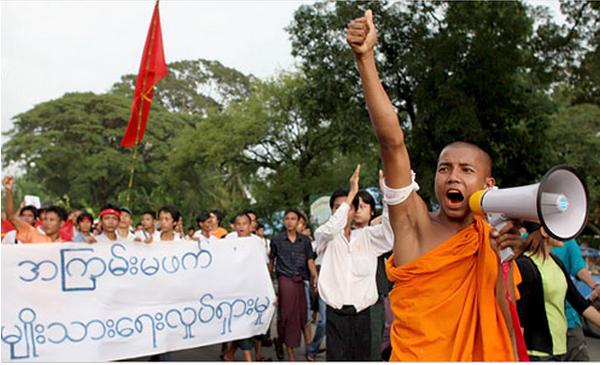[captionpix imgsrc=”https://pvnn.org/wp-content/uploads/2015/06/dianeburma.jpg” captiontext=”Photo courtesy of Global Solutions”]
In terms of the insurgent campaigns, there are particular circumstances that influence strategic choice. Insurgents will choose non-violence when they see that violence has failed them.[ref] I. Svensson and M. Lindgren, “From Bombs to Banners? The Decline of Wars and the Rise of Unarmed Uprisings in East Asia,” Security Dialogue 42.3 (2011): 226-227 Print.[/ref] Insurgents will also choose their strategy based on their desired outcomes, as violent tactics are usually utilized by groups seeking territorial power, while non-violence is seeking governmental change. [ref]Ibid, 220.[/ref] Modern technology also leads to non-violence, where information is available to the population on the success of non-violence. [ref] Peter Ackerman and Berel Rodal, “The Strategic Dimensions of Civil Resistance,” Survival 50.3 (2008): 121. Print.[/ref]
The non-violent victory modeled in Egypt resulted in the swift removal of former President Mubarak. The case of Burma, however, directly counters the failure of non-violence. Also known as Myanmar, Burma is a country with a deep and violent history. The country was in a state of civil war from 1962 until 2011. Burma adds to the global economy by providing ninety percent of the world’s rubies, exporting many precious stones, and exporting rice.[ref]“Export Partners of Burma (Myanmar),” CIA World Factbook, 2012, accessed June 16, 2015.[/ref] The global effects of violence in a country rooted in the global marketplace can have a highly negative trickle down effect to the international community, and of course the United States. Taking into account these rather destructive repercussions, the Vendetta focuses on the most effective manner in which the people of Burma can protest against certain governmental policies.
Perhaps the preferred method is best exemplified during the 1988 nonviolent revolution for democracy. The struggle did not follow the process of stripping political authority from leading figures, the deployment of the masses, and the loyalty shifts in security forces and civil servants. Firstly, the resistance failed to display the political toll of repressive rule to such a degree that the power of the regime was endangered. [ref]Maria J.Stephan and Erica Chenoweth, “Why Civil Resistance Works: The Strategic Logic of Nonviolent Conflict,” International Security 33.1 (2008): 41. Print.[/ref] The population continued to obey the leadership, and thus power continued in the lap of the leadership and not the movement. In addition, the masses were never mobilized. The non-violent resistance failed to present itself as a feasible alternative rule.[ref]Ibid, 39.[/ref] The movement never took hold amongst the majority of the citizenry as it did in Egypt, and those in the movement did not convey power or legitimacy. This shortfall worked in conjunction with the lack of loyalty shifts in the government sector. The military never defected, and civilian bureaucrats never did so either. This actually hindered the movement, as the military continued to support the incumbent regime and responded to the protests with violence.[ref]Ibid, 38.[/ref]
The process never followed through correctly because there wasn’t a comprehensive coalition, a realistic goal, or a strict adherence to non-violence. The mobilization of the Burmese was rather discerning and selective, as well as reliant to leaders.[ref]Ibid, 41.[/ref] A vast and inclusive array of peoples was lacking. So on, the Burmese who did join failed to come together collectively and form an attainable goal. When the movement was faced with an opportunity in the elections, they couldn’t come together to form a representative and legitimate leadership. The different factions of the movement were constantly bickering.[ref]Ibid, 40.[/ref] And most importantly, the movement failed to be completely non-violent. After the movement missed their opportunity in the elections, the incumbent government, the SLORC, decided to crack down on the movement with violence. This led many of the pro democracy citizens to retaliate with violence themselves, and tried to create a guerrilla movement against the dictatorship.[ref]Ibid, 41.[/ref]
If a government responds to non-violence in a violent way, the government can be deemed illegitimate and consent of power will be transferred to the non-violent insurgency. Repression fosters sympathy and supporters among both the population and government forces.[ref]Ibid, 11.[/ref] This idea is shown in the aforementioned Egyptian case, the repression lead to a successful non-violent insurgency.
A calm government response to a non-violent insurgency can greatly damage the insurgency. This is due to the idea that repression results in the backlash of the population, and with that lack of backlash the process of non-violence may not always follow through.[ref]Ibid, 41.[/ref] Legitimacy is still hands of the government when not using repression, and this does not allow some of the factors of non-violence to follow through.
Burma today is moving forward since military rule has ended and trying to recover from the mass amounts of human rights violations. They held their first democratic election in 2010, ushering in President Thein Sein who still rules today. The county is developing today from its years of economic sanctions, and is mostly divided between its Buddhist and Muslim communities.
Take Action:
Donate to the Suu Foundation in order to assist education and health efforts in Burma.
You can also donate to Partners Asia to help connect Burma to global resources.




